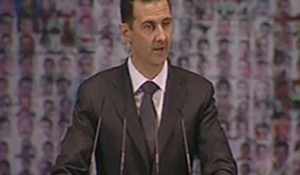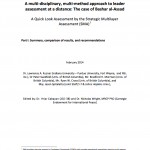Leader Assessment of Bashar al-Assad (Part I)

A Multi-disciplinary, Multi-method Approach to Leader Assessment at a Distance: The Case of Bashar al-Assad.
Author | Editor: Kuznar, L. (NSI, Inc), Suedfeld, P. (University of British Columbia), Spitaletta, J. (Johns Hopkins University/Applied Physics Laboratory) & Morrison, B. (University of British Columbia).
This report suggests potential types of actions and messages most likely to influence and deter Bashar al-Assad from using force in the ongoing Syrian civil war. This study is based on multidisciplinary discourse analyses of Bashar al-Assad’s speeches, and how he reacts to real events and verbal messages from external sources.
The results are summarized in a two-part report. Part I (this document) provides a summary, comparison of results, and recommendations. Part II describes each analytical approach in detail.
Data: The speeches used in the study were delivered by al-Assad from Jan 2000 to Sept 2013; the past six years was sampled most densely. Additional Twitter feeds were analyzed to gauge his influence in the region.
Analytical Approaches: Five separate methods analyzed the speeches: (a) automated text analytics that profile al-Assad’s decision making style and ability to appreciate alternative viewpoints; (b) integrative complexity (IC) analysis that reveals al-Assad’s ability to appreciate others’ viewpoints and integrate them into a larger framework; (c) thematic discourse analysis of the cultural and political themes al-Assad expresses before taking action or in reaction to events; (d) qualitative interpretations of major themes in al-Assad’s rhetoric; and (e) analysis of the spread of Twitter feeds. We highlight findings that reinforce each other as particularly robust for policy.
Summary Findings: The major findings of these studies include:
- al-Assad is capable of recognizing other viewpoints and evaluates them in a nuanced and context-dependent manner
- al-Assad values logical argumentation and empirical evidence al-Assad’s integrative complexity is relatively high, but might be lower before he takes decisive action or when under intense threat
- al-Assad’s reasoning is consistent with his Arab nationalist Ba’athist political ideology, and with a consistent opposition to Israel and Western domination; al-Assad sees Arab resistance and his leadership, or at least that of the Ba’ath party, as essential
Main Findings
Basic findings from studies of al-Assad’s speeches, 2000 – 2013
- Various Measures of Cognitive Complexity: Multiple measures converge to show that Assad is capable of appreciating different viewpoints and the nuances between them. al-Assad’s integrative complexity (his ability to differentiate different perspectives and integrate them) is relatively high compared to other leaders in the region. al-Assad furthermore demonstrates an ability to be logically consistent in how he evaluates situations, and is responsive to credible (in his view) empirical evidence.
- Deterrence: Traditional deterrence theory should apply to al-Assad generally, although during periods of intense stress he may deviate more from such a model.
- Integrative Complexity (IC): In general his IC has not changed over the course of the conflict. But analysis of specific events suggests his IC tends to be lower when under intense threat, or before taking decisive and violent action, compared to afterwards.
- Arab Nationalism: al-Assad wants to lead Arab interests; he is a staunch Arab nationalist.
- Opposition to the West and Israel: al-Assad wishes to oppose Western and Israeli influence in the Arab world; the history of Middle Eastern peace talks makes Assad cynical about Israel-Palestine negotiations, despite his cognitive inclination for negotiation. Assad’s narrative of opposing Israel decreases dramatically once Syrian unrest begins (March 2011); return to this narrative may be an indicator of his baseline rhetoric in times of relative peace within Syria.
- Secular Ba’athist Political Ideology: al-Assad’s reasoning and values are consistent with a more secular, Ba’athist, political ideology.
Key Recommendations
We used the doctrinal 7-Step MISO process to characterize al-Assad as a target audience of one, and we absorbed the relevant components of our multi-method analyses into the Target Audience Analysis format. Summary of Key Recommendations along with Supporting Analyses, Part II Location, and Confidence Level are shown in table one. The main practical recommendations are:
- Avoid direct threats to the Syrian Ba’athist regime’s hold on power;
- Appeal to al-Assad’s relatively high baseline level of Cognitive Complexity (ability to see different sides to an issue, flexible decision-making, openness to information), pragmatism, and respect for Arab nationalism to broker a negotiated settlement; and
- Identify and exploit al-Assad’s dynamic levels of Integrative Complexity to assess his relative susceptibility, develop arguments and recommended psychological actions and/or refine assessment criteria at a specific point in time.

Comments